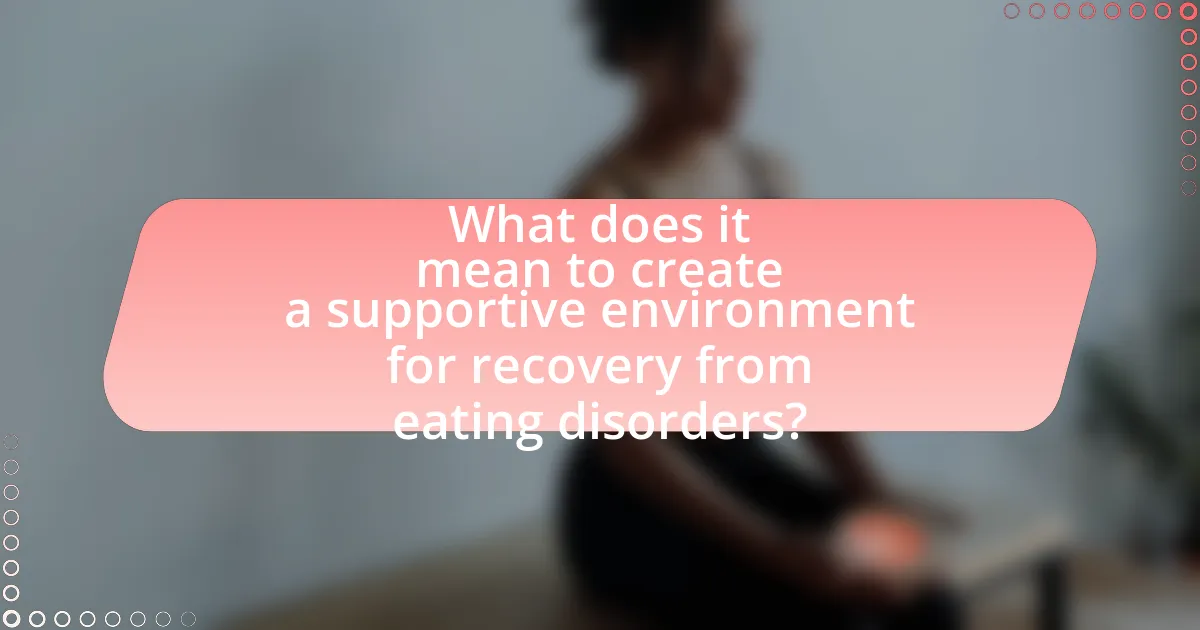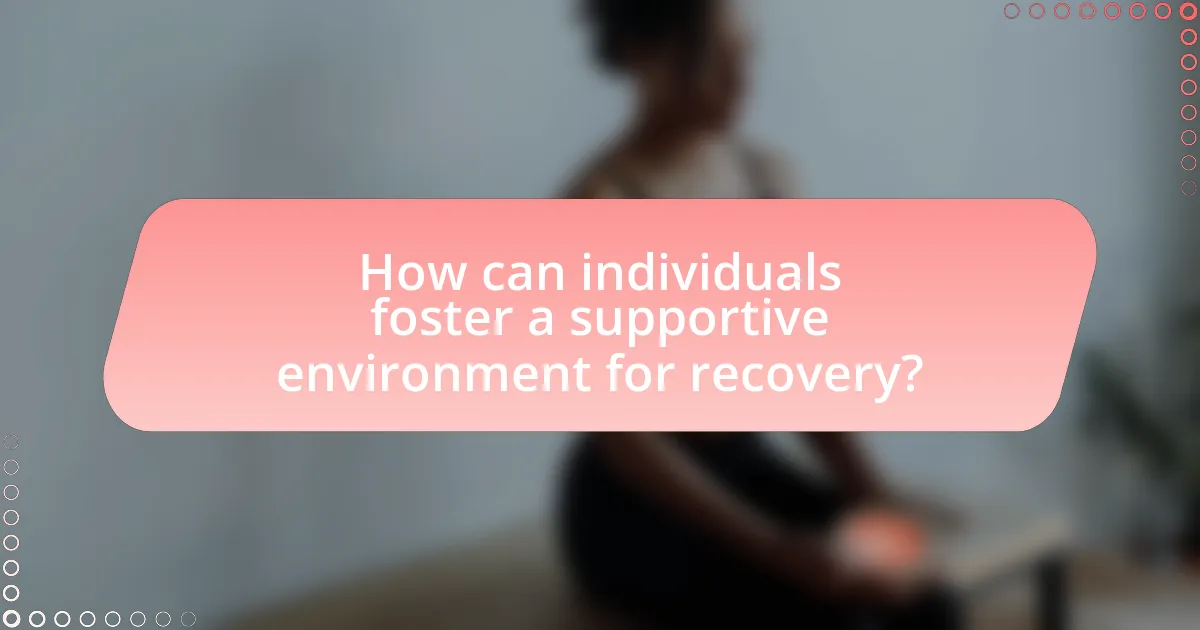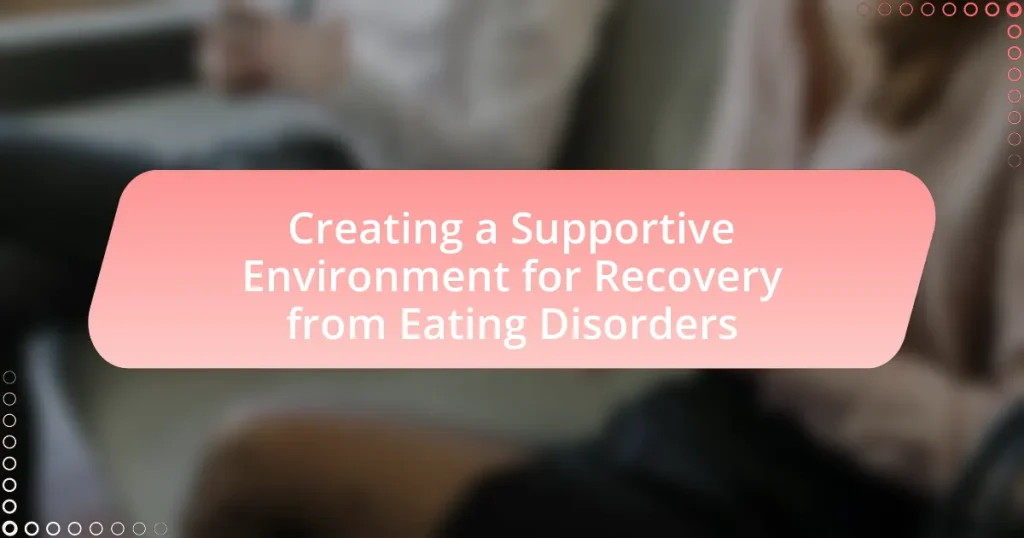Creating a supportive environment for recovery from eating disorders involves fostering understanding, compassion, and open communication among individuals. This article outlines the significance of emotional support, the psychological and physical benefits of a nurturing atmosphere, and the key components necessary for effective recovery. It highlights the roles of family, friends, and healthcare professionals in providing support, as well as strategies individuals can implement to enhance their recovery journey. Additionally, the article addresses challenges such as stigma and lack of resources, offering practical tips for maintaining a supportive environment over time.

What does it mean to create a supportive environment for recovery from eating disorders?
Creating a supportive environment for recovery from eating disorders means fostering a space that promotes understanding, compassion, and open communication. This environment includes providing emotional support, encouraging healthy behaviors, and minimizing stigma associated with eating disorders. Research indicates that social support significantly enhances recovery outcomes, as individuals who feel understood and accepted are more likely to engage in treatment and adhere to recovery plans. For instance, a study published in the Journal of Eating Disorders found that supportive family dynamics and peer relationships correlate with improved recovery rates, highlighting the importance of a nurturing atmosphere in the healing process.
Why is a supportive environment crucial for recovery?
A supportive environment is crucial for recovery because it fosters emotional safety and encourages positive behavioral changes. Research indicates that individuals recovering from eating disorders benefit significantly from social support, which can enhance motivation and resilience. A study published in the Journal of Eating Disorders found that patients with strong social networks experienced lower relapse rates and improved treatment outcomes. This highlights the importance of a nurturing atmosphere in facilitating recovery and promoting long-term health.
What psychological benefits does a supportive environment provide?
A supportive environment provides significant psychological benefits, including enhanced self-esteem, reduced anxiety, and improved emotional resilience. Individuals in such environments often experience increased feelings of safety and acceptance, which fosters open communication and vulnerability. Research indicates that social support can lead to lower levels of stress hormones, such as cortisol, and promote positive mental health outcomes. For instance, a study published in the Journal of Health Psychology found that individuals with strong social support networks reported higher levels of life satisfaction and lower levels of depression. This evidence underscores the critical role that a supportive environment plays in psychological well-being, particularly in the context of recovery from eating disorders.
How does a supportive environment impact physical health during recovery?
A supportive environment significantly enhances physical health during recovery by providing emotional stability, reducing stress, and promoting adherence to treatment plans. Research indicates that individuals recovering from eating disorders experience improved outcomes when surrounded by understanding family and friends, as this support fosters a sense of belonging and motivation. For instance, a study published in the Journal of Eating Disorders found that social support positively correlates with recovery rates, highlighting that individuals with strong support systems are more likely to engage in healthy behaviors and maintain nutritional intake. This supportive context not only aids in psychological healing but also directly influences physical health by encouraging regular meals and reducing the likelihood of relapse.
What are the key components of a supportive environment?
The key components of a supportive environment for recovery from eating disorders include emotional support, open communication, and a non-judgmental atmosphere. Emotional support involves providing empathy and understanding, which fosters a sense of safety for individuals in recovery. Open communication encourages sharing feelings and experiences, allowing individuals to express their struggles without fear. A non-judgmental atmosphere is crucial as it helps reduce shame and stigma, promoting acceptance and healing. Research indicates that these components significantly enhance recovery outcomes, as they create a foundation for trust and collaboration in the recovery process.
How can family and friends contribute to a supportive atmosphere?
Family and friends can contribute to a supportive atmosphere by providing emotional support, understanding, and encouragement during the recovery process from eating disorders. This support can manifest through active listening, validating feelings, and offering reassurance, which fosters a sense of safety and acceptance. Research indicates that social support significantly impacts recovery outcomes; for instance, a study published in the Journal of Eating Disorders found that individuals with strong family support reported lower levels of eating disorder symptoms and higher levels of recovery motivation. By engaging in open communication and participating in treatment discussions, family and friends can help create an environment that promotes healing and resilience.
What role do healthcare professionals play in creating support?
Healthcare professionals play a crucial role in creating support for individuals recovering from eating disorders by providing comprehensive care, guidance, and emotional support. They assess patients’ physical and mental health, develop personalized treatment plans, and facilitate access to necessary resources, such as nutritional counseling and therapy. Research indicates that a multidisciplinary approach, involving dietitians, psychologists, and medical doctors, significantly enhances recovery outcomes, as evidenced by a study published in the Journal of Eating Disorders, which found that integrated care models improve patient engagement and reduce relapse rates.

How can individuals foster a supportive environment for recovery?
Individuals can foster a supportive environment for recovery by actively promoting open communication and understanding. This involves listening without judgment, validating feelings, and encouraging individuals to express their thoughts and experiences related to their recovery journey. Research indicates that social support significantly enhances recovery outcomes; for instance, a study published in the Journal of Eating Disorders found that individuals with strong social networks reported lower levels of eating disorder symptoms. Additionally, creating a safe space where individuals feel comfortable sharing their struggles can lead to increased motivation and accountability in their recovery process.
What strategies can individuals implement to support themselves?
Individuals can implement strategies such as establishing a structured routine, practicing mindfulness, and seeking social support to support themselves in recovery from eating disorders. A structured routine helps create predictability and stability, which can reduce anxiety and promote healthier eating habits. Mindfulness practices, such as meditation and journaling, enhance self-awareness and emotional regulation, allowing individuals to better understand their triggers and responses. Additionally, seeking social support from friends, family, or support groups fosters a sense of community and accountability, which is crucial for recovery. Research indicates that social support significantly correlates with improved recovery outcomes in individuals with eating disorders, highlighting the importance of these strategies.
How can self-care practices enhance a supportive environment?
Self-care practices enhance a supportive environment by promoting individual well-being, which in turn fosters a culture of empathy and understanding among peers. When individuals engage in self-care, they are better equipped to manage stress, communicate effectively, and support others, creating a positive feedback loop. Research indicates that self-care activities, such as mindfulness and physical exercise, can reduce anxiety and improve emotional regulation, which are crucial for maintaining healthy relationships. A study published in the Journal of Clinical Psychology found that individuals who practiced self-care reported higher levels of social support and lower levels of perceived stress, demonstrating the direct impact of self-care on the quality of interpersonal interactions.
What are effective communication techniques to express needs?
Effective communication techniques to express needs include using “I” statements, active listening, and being specific about one’s feelings and requirements. “I” statements help individuals articulate their feelings without placing blame, such as saying, “I feel overwhelmed when I don’t have support.” Active listening involves fully concentrating on the speaker, which fosters understanding and empathy, essential in recovery contexts. Being specific about needs, like stating, “I need help with meal planning,” clarifies expectations and encourages constructive dialogue. Research indicates that clear communication significantly enhances interpersonal relationships and support systems, which are crucial for recovery from eating disorders.
How can peers support each other in recovery?
Peers can support each other in recovery by fostering open communication, sharing experiences, and providing emotional encouragement. Open communication allows individuals to express their feelings and challenges, creating a safe space for vulnerability. Sharing experiences helps peers relate to one another, reducing feelings of isolation and promoting understanding. Emotional encouragement, such as celebrating milestones and offering reassurance during setbacks, strengthens the recovery process. Research indicates that peer support can significantly enhance recovery outcomes, as evidenced by a study published in the Journal of Eating Disorders, which found that individuals who engaged in peer support reported higher levels of motivation and lower levels of relapse.
What are the benefits of support groups in recovery?
Support groups in recovery provide emotional support, accountability, and shared experiences, which are crucial for individuals overcoming challenges such as eating disorders. These groups foster a sense of belonging and reduce feelings of isolation, as participants connect with others who understand their struggles. Research indicates that individuals who engage in support groups experience improved recovery outcomes, with studies showing that 70% of participants report enhanced coping skills and a greater sense of hope. Additionally, support groups often encourage healthy behaviors and provide practical strategies for managing triggers, further reinforcing the recovery process.
How can shared experiences foster a sense of community?
Shared experiences can foster a sense of community by creating common ground among individuals, which enhances social bonds and mutual understanding. When people engage in similar activities or face comparable challenges, such as those encountered in recovery from eating disorders, they develop empathy and support for one another. Research indicates that group therapy settings, where individuals share their experiences, significantly improve recovery outcomes by reducing feelings of isolation and promoting a sense of belonging. For instance, a study published in the Journal of Eating Disorders found that participants in support groups reported higher levels of social support and lower levels of anxiety and depression, demonstrating the positive impact of shared experiences on community building.

What challenges might arise in creating a supportive environment?
Creating a supportive environment for recovery from eating disorders can face several challenges, including stigma, lack of understanding, and insufficient resources. Stigma surrounding mental health issues often leads to judgment and isolation, making individuals reluctant to seek help. Additionally, a lack of understanding among family and friends about eating disorders can result in unintentional harm, as they may not know how to provide appropriate support. Furthermore, insufficient resources, such as access to trained professionals and support groups, can hinder the establishment of a nurturing environment essential for recovery. These challenges highlight the need for education and awareness to foster a truly supportive atmosphere.
What common obstacles do individuals face in seeking support?
Individuals face several common obstacles in seeking support for eating disorders, including stigma, fear of judgment, and lack of awareness about available resources. Stigma surrounding mental health issues often leads to feelings of shame, which can deter individuals from reaching out for help. Fear of judgment from peers or family members can create additional barriers, as individuals may worry about how they will be perceived if they disclose their struggles. Furthermore, a lack of awareness about treatment options and support networks can prevent individuals from accessing the help they need, as they may not know where to turn for assistance. These factors collectively hinder the process of seeking support, making recovery more challenging.
How can stigma surrounding eating disorders hinder support?
Stigma surrounding eating disorders significantly hinders support by creating barriers to open communication and understanding. Individuals affected by eating disorders may feel ashamed or embarrassed to seek help due to societal misconceptions that label these disorders as a choice or a lack of willpower. This stigma can lead to isolation, as those suffering may avoid discussing their struggles with friends, family, or healthcare providers, fearing judgment or misunderstanding. Research indicates that stigma can exacerbate feelings of worthlessness and anxiety, further deterring individuals from accessing necessary treatment and support services. For instance, a study published in the “International Journal of Eating Disorders” found that stigma is a major factor in the reluctance to seek help, with 60% of participants reporting that they felt judged when discussing their eating issues.
What strategies can be used to overcome these challenges?
To overcome challenges in creating a supportive environment for recovery from eating disorders, implementing comprehensive education and awareness programs is essential. These programs can inform family members, friends, and the community about the complexities of eating disorders, fostering empathy and understanding. Research indicates that increased awareness significantly reduces stigma, which is a barrier to recovery (National Eating Disorders Association, 2021). Additionally, establishing support groups provides individuals with a safe space to share experiences and receive encouragement, which has been shown to enhance recovery outcomes (Treasure et al., 2015). Lastly, promoting open communication within families can help address underlying issues and strengthen relationships, further supporting the recovery process.
How can one maintain a supportive environment over time?
To maintain a supportive environment over time, consistent communication and active engagement are essential. Regularly checking in with individuals, providing encouragement, and fostering open dialogue about feelings and challenges help sustain a nurturing atmosphere. Research indicates that environments characterized by trust and understanding significantly enhance recovery outcomes for individuals with eating disorders, as highlighted in the study “The Role of Family Support in Recovery from Eating Disorders” by Le Grange et al. (2016), which emphasizes the importance of ongoing support in the recovery process.
What practices can ensure ongoing support during recovery?
Ongoing support during recovery from eating disorders can be ensured through consistent communication, structured therapy sessions, and involvement in support groups. Consistent communication with healthcare providers and loved ones fosters a sense of accountability and encouragement, which is crucial for recovery. Structured therapy sessions, such as cognitive-behavioral therapy, provide individuals with coping strategies and tools to manage their thoughts and behaviors related to eating. Participation in support groups offers a community of shared experiences, reducing feelings of isolation and providing emotional support. Research indicates that individuals who engage in these practices are more likely to maintain recovery and experience improved mental health outcomes.
How can individuals adapt their support systems as they progress?
Individuals can adapt their support systems by actively reassessing their needs and engaging with different resources as they progress in their recovery from eating disorders. As individuals gain insights into their emotional and psychological requirements, they may find that certain relationships or support mechanisms become more or less beneficial. For instance, transitioning from reliance on family support to engaging with peer support groups can provide a sense of community and shared experience that is crucial during different recovery stages. Research indicates that social support is linked to improved recovery outcomes, highlighting the importance of tailoring support systems to fit evolving needs.
What are some practical tips for creating a supportive environment for recovery?
To create a supportive environment for recovery from eating disorders, establish open communication and foster a non-judgmental atmosphere. Open communication allows individuals to express their feelings and challenges, which is crucial for recovery. A non-judgmental atmosphere encourages honesty and reduces feelings of shame, making it easier for individuals to seek help. Additionally, providing access to resources such as therapy, support groups, and educational materials can enhance the recovery process. Research indicates that social support significantly improves recovery outcomes, as highlighted in a study published in the Journal of Eating Disorders, which found that individuals with strong support networks are more likely to achieve and maintain recovery.


